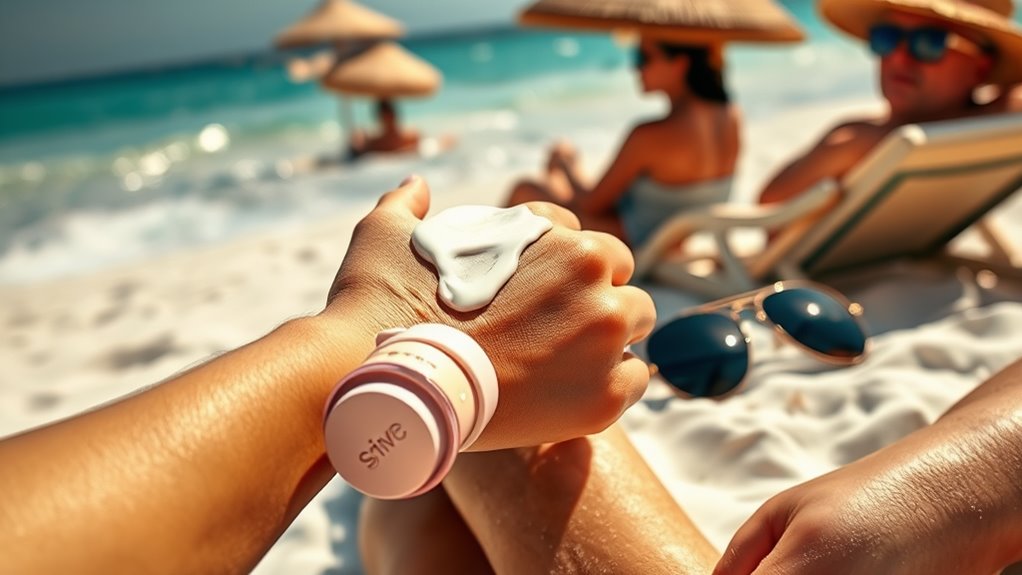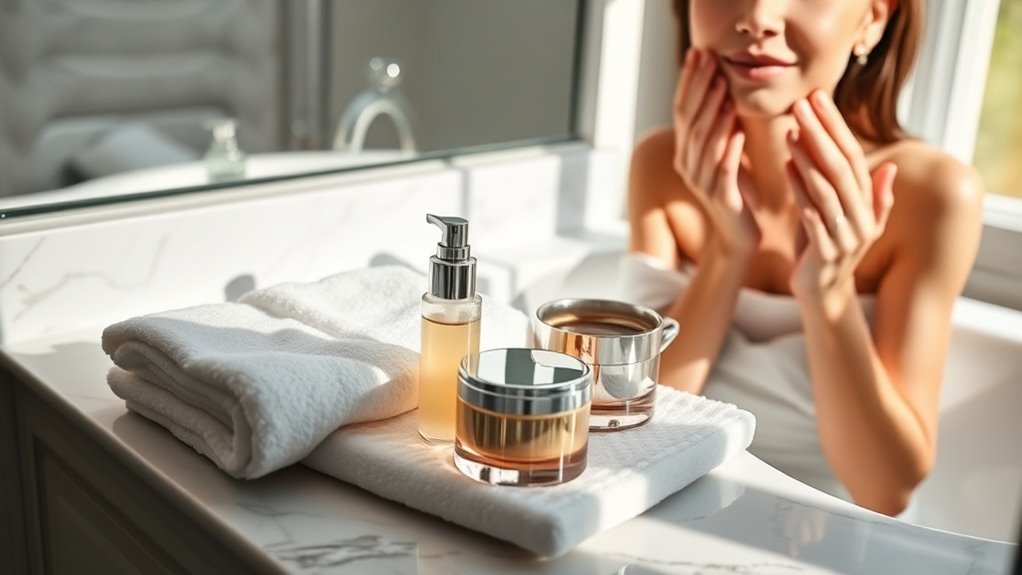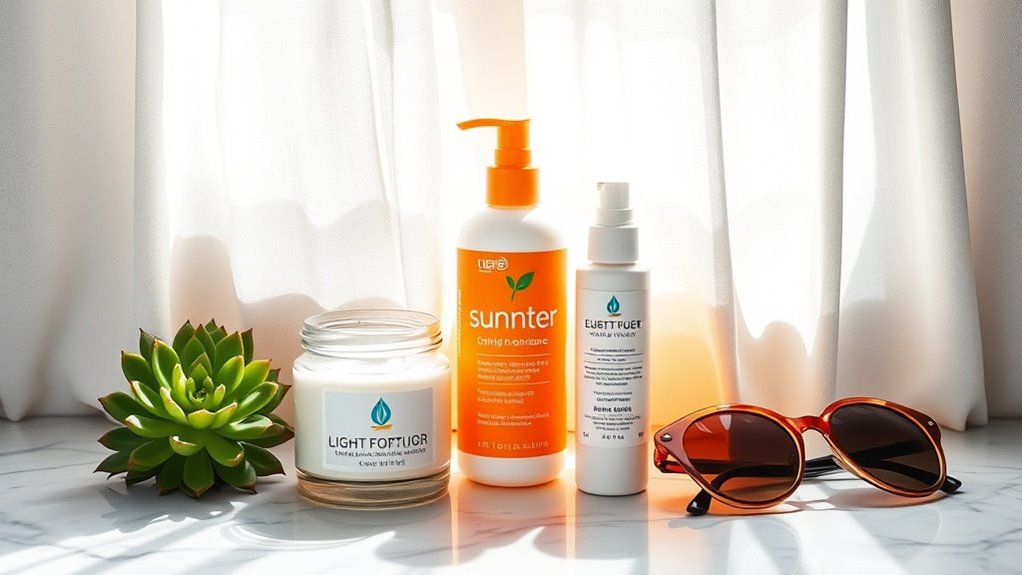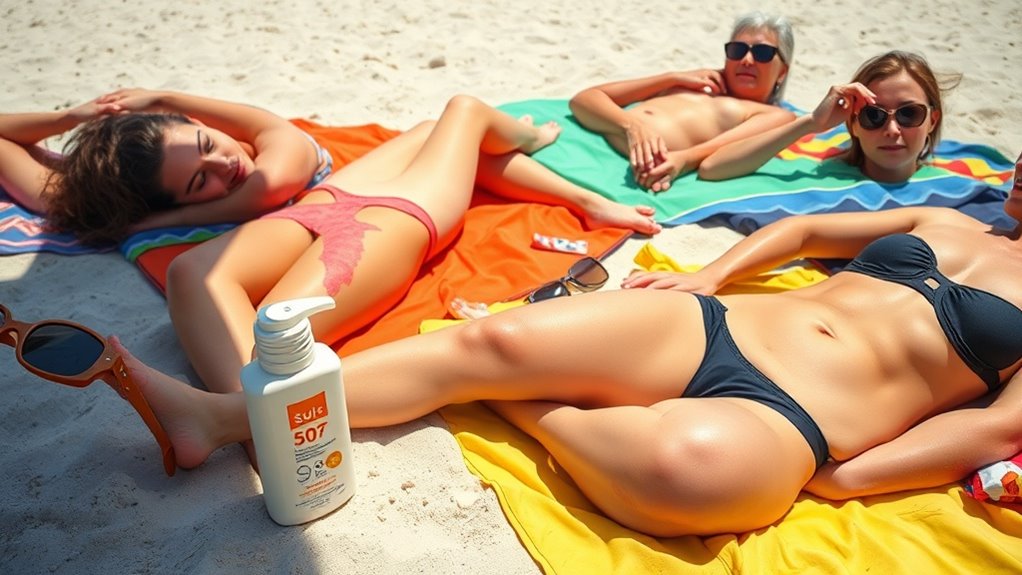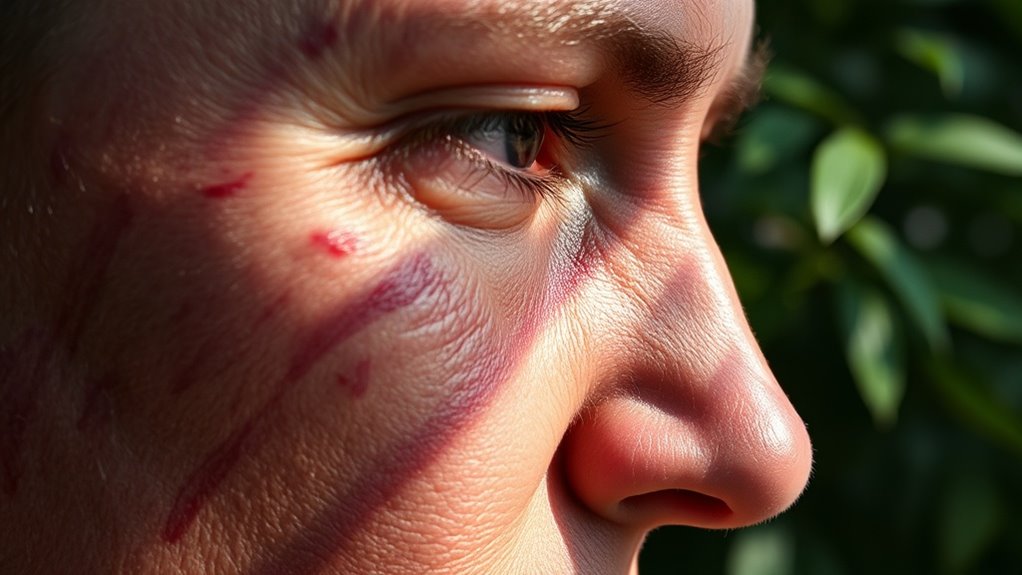Sunscreen Myths That Are Secretly Aging You!
You might think sunscreen is only for beach days or that your darker skin tone protects you enough. But these beliefs could be aging your skin faster than you realize. UV rays can sneak through clouds and windows, and skipping daily application can lead to significant damage. Curious about the other myths that could be affecting your skin’s health? Let’s explore what you might be missing.
Myth 1: Sunscreen Is Only Necessary on Sunny Days
Many people mistakenly believe that sunscreen is only essential on sunny days, but that’s far from the truth.
If you’re part of a community that loves spending time outdoors, you need to be aware of sun protection myths. Even on cloudy days, up to 80% of harmful UV rays can reach your skin, leading to damage you mightn’t immediately see.
You might think that staying in the shade or wearing a hat is enough, but those methods alone won’t provide adequate protection. In fact, evidence-based corrections emphasize the importance of daily sunscreen use regardless of the weather conditions.
Myth 2: Higher SPF Means Better Protection
Choosing a sunscreen with a high SPF might seem like the best way to ensure maximum protection, but that’s a common misconception.
While it’s true that a higher SPF blocks slightly more UVB rays, the difference isn’t as significant as you might think. For example, SPF 30 blocks about 97% of UVB rays, while SPF 50 blocks around 98%. That’s just a 1% difference!
What’s more important than the SPF number is how you apply the sunscreen. Most people don’t use enough product or forget to reapply every two hours.
If you’re part of a community that enjoys outdoor activities, you know how easily this can happen. So, instead of fixating on higher SPF, focus on using a broad-spectrum sunscreen, applying generously, and reapplying regularly.
Additionally, many people are unaware that SPF effectiveness can be diminished by factors like sweating or swimming, which further emphasizes the importance of proper application habits.
Embracing these habits will keep your skin protected and looking youthful, making you feel confident in your skin.
Myth 3: You Can Skip Sunscreen if You Have Darker Skin
While darker skin offers some natural protection against UV rays, it doesn’t mean you can skip sunscreen. Many believe that melanin shields them completely from sun damage, but that misconception can lead to serious skin issues.
Even with your gorgeous complexion, UV rays can still cause premature aging and increase the risk of skin cancer. Embracing your unique beauty means taking care of it, and using sunscreen is essential for everyone, regardless of skin tone. Daily application of sunscreen is crucial for preventing premature aging, making it a vital step in your skincare routine.
Choose a broad-spectrum SPF of at least 30 and apply it daily, even on cloudy days. It’s not just about preventing sunburn; it’s about keeping your skin youthful and healthy.
When you’re out with friends or enjoying a sunny day, make sunscreen a part of your routine. You deserve to feel confident in your skin, and that means protecting it.
Myth 4: Sunscreen Is Only Needed for Outdoor Activities
Even if you’re spending most of your time indoors, you still need to wear sunscreen. UV rays can reach you through windows, and prolonged exposure can lead to skin damage and premature aging. You might think you’re safe inside, but those rays can still penetrate and affect your skin. When you’re working at your desk, lounging on the couch, or even driving, you’re exposed to harmful UV radiation. It’s not just about beach days or outdoor adventures; your daily routine can still put you at risk. Additionally, indoor UV exposure can contribute significantly to cumulative skin damage over time.
Myth 5: Water-Resistant Sunscreen Provides All-Day Protection
Many people believe that water-resistant sunscreen offers all-day protection, but this isn’t entirely true. While it does provide some extra durability against sweat and water, it still requires reapplication.
Here are four important points to keep in mind:
-
Duration Limits: Most water-resistant formulas last either 40 or 80 minutes, depending on the label.
-
Activity Matters: If you swim, sweat, or towel off, you’ll need to reapply sooner than you think.
-
Application Technique: Make sure you’re applying the right amount—about one ounce for full-body coverage.
-
Skin Type Considerations: Different skin types may absorb or wash off sunscreen differently, affecting its efficacy.
Additionally, it’s essential to remember that sunscreen effectiveness can diminish over time, further emphasizing the need for regular reapplication throughout the day.
Myth 6: Expired Sunscreen Is Still Effective
Although you might think that expired sunscreen can still offer some protection, the truth is it loses its effectiveness over time. When you apply old sunscreen, you’re risking sunburn, premature aging, and even skin cancer.
Many of us share the same struggle of wanting to save money and not waste products, but your skin deserves better. Sunscreens usually come with an expiration date for a reason. Ingredients break down, and the protection they provide diminishes. Additionally, using products with potentially harmful ingredients can further compromise your skin’s health.
Instead of holding onto that bottle from last summer’s beach trip, treat yourself to a fresh, new sunscreen. It’s important to prioritize your skin health, especially when you want to look and feel your best.
Join others in making smart choices for sun protection. You’ll not only feel good about your decision but also protect your skin from harmful UV rays. Remember, it’s always better to be safe than sorry!

